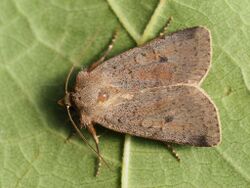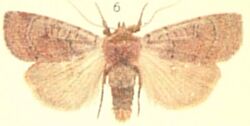Biology:Protolampra sobrina
| Protolampra sobrina | |
|---|---|

| |

| |
| Scientific classification | |
| Domain: | Eukaryota |
| Kingdom: | Animalia |
| Phylum: | Arthropoda |
| Class: | Insecta |
| Order: | Lepidoptera |
| Superfamily: | Noctuoidea |
| Family: | Noctuidae |
| Genus: | Protolampra |
| Species: | P. sobrina
|
| Binomial name | |
| Protolampra sobrina (Duponchel, 1843)
| |
| Synonyms | |
| |
Protolampra sobrina, the cousin german, is a moth of the family Noctuidae. The species was first described by Philogène Auguste Joseph Duponchel in 1843. It is found in most of Europe, then east across the Palearctic to Siberia, Altai, Irkutsk, Kamchatka and Korea.
The wingspan is 34–39 mm. Meyrick describes it - Antennae in male shortly ciliated. Head deep ferruginous-reddish. Forewings rather dark purplish-brown; lines very indistinctly darker-margined, median shade faintly darker; orbicular and reniform indistinctly outlined with darker, lower end of reniform darker; subterminal line somewhat paler. Hindwings light fuscous, darker terminally. Larva brown-reddish; sides grey-freckled; dorsal and subspiracular lines pale; dots minute, black; head brownish ochreous.[1]
Similar species
Protolampra sobrina is difficult to certainly distinguish from its congeners. See Townsend et al.[2]
- Diarsia mendica ssp. mendica (Fabricius, 1775)
- Diarsia mendica ssp. thulei (Staudinger, 1891)
- Diarsia mendica ssp. orkneyensis (Bytinski-Salz, 1930)
- Diarsia rubi (Vieweg, 1790)
- Diarsia florida (Schmidt, 1859)
The larvae feed on Rosa acicularis, Sorbus aucuparia, Calluna vulgaris and Vaccinium uliginosum. Adults are on wing from July to August.
References
- ↑ Meyrick, E., 1895 A Handbook of British Lepidoptera MacMillan, London pdf
 This article incorporates text from this source, which is in the public domain.
This article incorporates text from this source, which is in the public domain.
- ↑ Martin C. Townsend, Jon Clifton and Brian Goodey (2010). British and Irish Moths: An Illustrated Guide to Selected Difficult Species. (covering the use of genitalia characters and other features) Butterfly Conservation.
External links
- Kimber, Ian. "73.367 BF2116 Cousin German Protolampra sobrina (Duponchel, [1843)"]. https://ukmoths.org.uk/species/protolampra-sobrina/. Retrieved 4 July 2019.
- Lepiforum e.V.
Wikidata ☰ Q1377555 entry
 |


